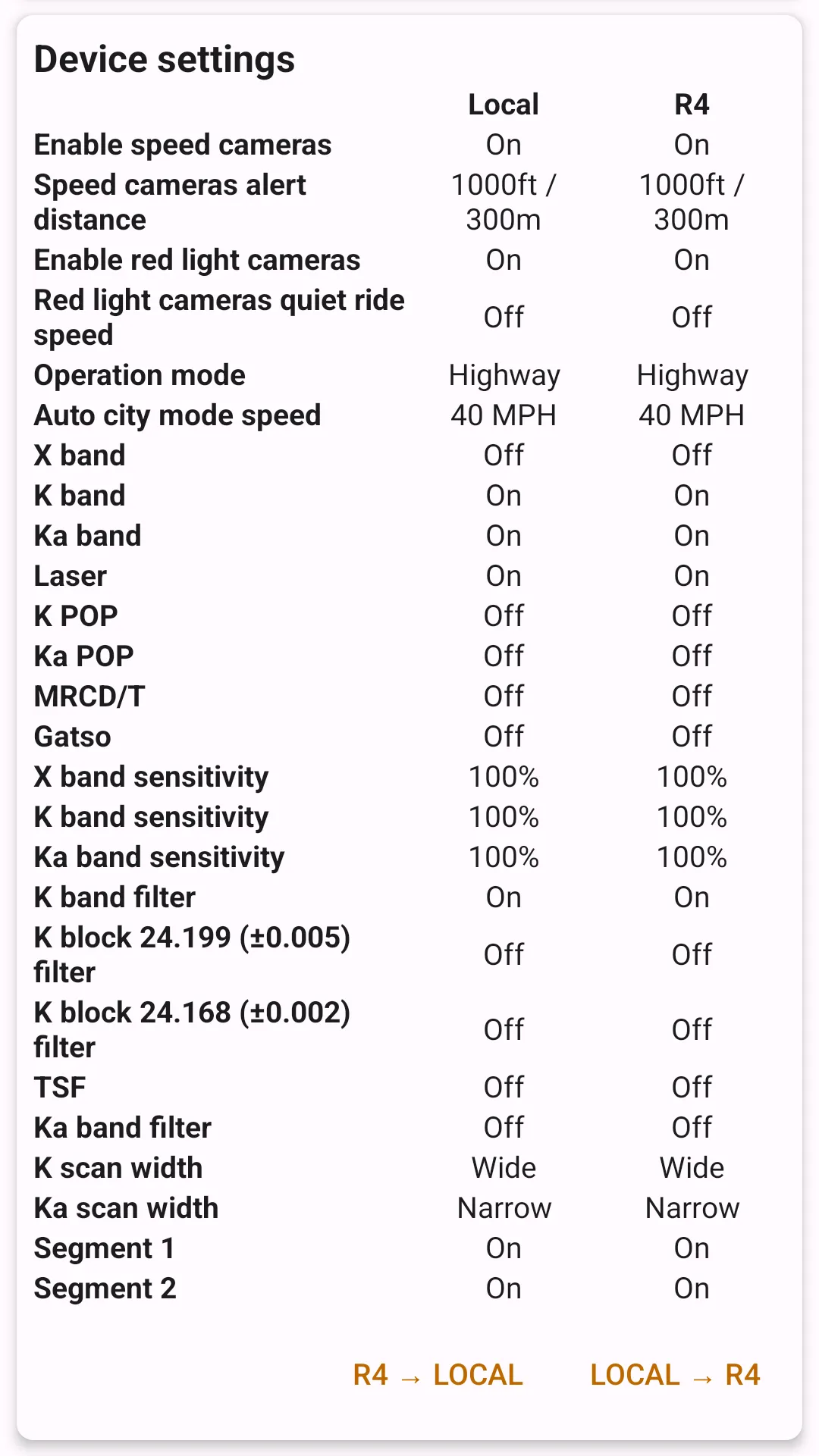Uniden R4/R8/R9
Configured in
Settings → Radar detector integration → R4 connection managerorR8 connection managerorR9 connection manager. TheRadar detector modelpreference underSettings → Radar detector integrationshould be set toUniden R4orUniden R8orUniden R8for these preferences to appear.
Connecting To The Detector
Before you start: Please ensure that your detector firmware supports Bluetooth. If there are no Bluetooth options in the detector settings menu, then you might need to update your firmware.
- To check your version, on the detector go to the menu and find "Ver" item.
- Please look for instructions and required files at the Uniden website to update your detector's firmware.
Pairing With The Detector
Pairing is performed from the Android's system settings. You need to pair the detector only once, you won't need to do it again as long as the detector isn't "forgotten" in the Android preferences.
The following instructions are based on a vanilla Android 12. Some phone manufacturers may have their own settings menu (Samsung is well-known for this, for example); in this case, the steps may differ. Also, on older Android versions, the steps may differ as well. For these devices try the steps may slightly differ.
To pair your Uniden detector with your Android phone:
- On detector, enable Bluetooth by going to Menu → Bluetooth → On.
- On Android, activate a search for nearby Bluetooth devices by going to System settings → Connected devices → Pair new device.
- On detector, enter the pairing mode by going to Settings → BT pairing.
- On Android, look for your Uniden device; it should be named R4@XX or R8@XX or R9@XX depending on your model, where XX are two symbols.
- On Android, tap on your device once it shows up; after that, a "Pairing Succeeded" message should appear on your detector.
- Restart your detector – this is a crucial step as, occasionally, the Bluetooth connection goes to an invalid state right after pairing.
Once the detector is paired with the phone, you can pair it with the Highway Radar. To do this, in the Highway Radar application:
- Proceed to the connection manager in the preferences. You can also get there by pressing the "R4 Bluetooth Connection" or "R4 Bluetooth Connection" on the start screen in the "Configuration Status" section.
- From there, ensure that your detector is powered on and no other device is connected to it (there is no Bluetooth icon on the detector display).
- Press the "Scan" button in the connection manager on your phone, and select your detector.
- After selecting your detector, wait for 5-10 seconds for the application to connect. If the reconnect doesn't happen, restart your detector, and toggle Bluetooth on your phone off and on.
Highway Radar remembers the detector and automatically reconnects whenever it is in range. Press the "Forget" button in the connection manager to forget the detector. Note that "forgetting" the detector in Highway Radar doesn't "forget" the detector in the system settings – this means that you shouldn't perform the pairing again to reconnect your Uniden detector to Highway Radar.
Connection Manager
The connection manager consists of three sections: Connection, device settings, and alerts table.
Connection
Connection displays connection status and the remembered detector name. The scan button is used to pair a new detector, and the forget button clears the currently paired one.
Device Settings
This section is only displayed when a detector is connected.
Highway Radar stores a copy of detector settings internally and supports two-way synchronization. In this section, both settings are displayed. You can change local values from the application in **`Settings → Radar detector integration → R4/R8 internal Settings``*; however, local values don't affect how the detector operates. R4 or R8 values are stored and set on the detector itself, and the detector uses them for operation.
You can copy settings both ways. Pressing the R4 → Local or R8 → Local or R9 → Local button copies settings from the device to the application storage. Pressing the Local → R4 or Local → R8 button writes settings from the application storage to the detector. You can also push settings to the detector from the internal settings menu (equivalent to pressing Local → R4 or Local → R8 or Local → R9).
Alerts Table
This section is only displayed when a detector is connected.
It displays a list of signals currently detected by the detector with bands, frequencies, and strengths. You can use that list for verification of the connection health.
Changing Internal Settings
One of the good benefits of R4/R8/r9 integration is managing the detector settings from a user-friendly interface on a big phone screen. To update internal detector settings, proceed to Settings → Radar detector integration → R4/R8/R8 Internal Settings and set up your desired configuration. Then, to push the settings to the detector, tap the "Push settings to R4/R8/R9" button in the internal settings menu. Another way to push settings is proceeding to the R4/R8/R9 connection manager and pressing the Local → R4 or Local → R8 or Local → R9 button in the Device Settings section.
Setting Detector Volume
In the internal settings you may also set detector volume. Please note that detector will return to that volume after every alert, even if you change the volume using the detector buttons. To prevent this behavior, you may set the detector volume to the "Controled only from device", which is at the leftmost value of the slider.











